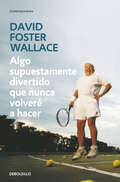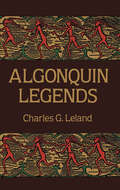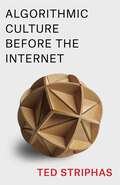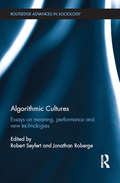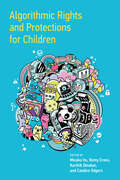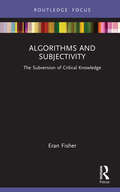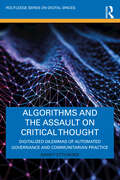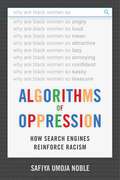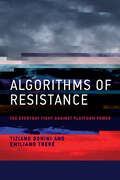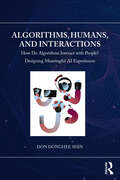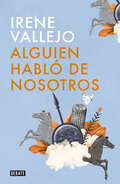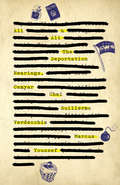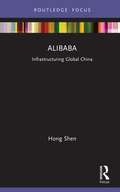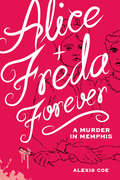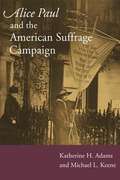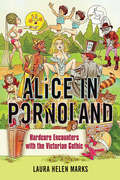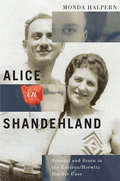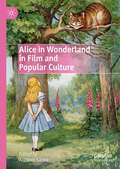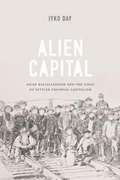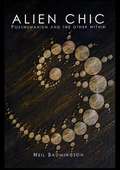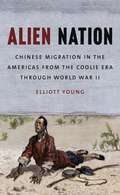- Table View
- List View
Algo supuestamente divertido que nunca volveré a hacer
by David Foster WallaceEste artículo es una de las radiografías más agudas e irreverentes de la cultura americana de fin de siglo, en la que se entremezclan la familiaridad, el asombro y una mordacidad descabellada. Foster Wallace elabora en Algo supuestamente divertido que nunca volveré a hacer una postal gigantesca basada en su experiencia en un crucero de lujo por el Caribe. Lo que a primera vista parece ser un simple viaje «para relajarse», en manos de un humor delirante y un cinismo corrosivo acabará convirtiéndose en el horror más absoluto. La crítica ha dicho...«La obra de no ficción más brillante y divertida que se ha escrito en los últimos años.»John Glassie, Time Out New York «Animado por una prosa maravillosamente exuberante [...] este volumen confirma al señor Wallace como uno de los talentos más destacados de su generación.»The New York Times «Wallace escribe con una intensidad que transforma un reportaje errático en una forma sui generis de filosofía.»Kirkus Reviews «Su instinto para reproducir lo coloquial avergonzaría a maestros como Pynchon y DeLillo, y la sobriedad humana que confiere a sus temas, de ficción o de no ficción, deberían ser un modelo para cualquiera que escriba crítica cultural, tanto en la forma de relatos como en ensayos como estos.»Publishers Weekly
Algonquin Legends (Native American Ser.)
by Charles G. LelandThis classic collection contains myths, legends, and folklore of the principal Wabanaki, or northeastern Algonquin Indians, i.e. the Passamaquoddies and Penobscots of Maine and the Micmacs of New Brunswick. Most of this material was gathered directly from Indian narrators by Charles G. Leland (1824-1903), a brilliant and gifted Philadelphia-born journalist, essayist, and folklorist.In compiling the work, Leland noted interesting affinities between the myths of the Northeastern tribes and those of the Eskimos, and striking similarities between the myths of the Algonquins and the Eddas, sagas and popular tales of Scandinavia. For example, may of the stories in this book deal with Glooskap, a divinity with strong resemblances to such Norse gods as Thor and Odin. We learn how Glooskap made man from an ash tree, named the animals, gave gifts to men, went to England and France and made America known to the Europeans, and performed many other curious deeds. Here too are the merry tales of Lox, the Mischief-maker, who bears a strong resemblance to Loki of Scandinavian mythology. Also included are the amazing adventures of Master Rabbit, the Chenoo legends, stories of At-o-sis the serpent, the story of the Three Strong Men, the Weewillmekq', tales of magic, and more.Myths and legends provide unique and authentic sources of knowledge about our deepest instincts and ways of interpreting the world and our place in it. This volume remains one of the most powerful and revealing studies of the Algonquin versions of such myths, a thorough, comprehensive collection that will prove invaluable to any student of American Indian culture or myth, folklore, and religion. General readers will also find these tales highly readable and delightfully entertaining.
Algorithmic Culture Before the Internet
by Ted StriphasToday, algorithms exercise outsize influence on cultural decision-making, shaping and even reshaping the concept of culture. How were automated, computational processes empowered to perform this work? What forces prompted the emergence of algorithmic culture?Algorithmic Culture Before the Internet is a history of how culture and computation came to be entangled. From Cambridge, England, to Cambridge, Massachusetts, by way of medieval Baghdad, this book pinpoints the critical junctures at which algorithmic culture began to coalesce in language long before it materialized in the technological wizardry of Silicon Valley. Revising and extending the methodology of “keywords,” Ted Striphas examines changing concepts and definitions of culture, including the development of the field of cultural studies, and stresses the importance of language in the history of technology.Offering historical and interdisciplinary perspective on the relationship of culture and computation, this book provides urgently needed context for the algorithmic injustices that beset the world today.
Algorithmic Cultures: Essays on Meaning, Performance and New Technologies (Routledge Advances in Sociology)
by Robert Seyfert and Jonathan RobergeThis book provides in-depth and wide-ranging analyses of the emergence, and subsequent ubiquity, of algorithms in diverse realms of social life. The plurality of Algorithmic Cultures emphasizes: 1) algorithms’ increasing importance in the formation of new epistemic and organizational paradigms; and 2) the multifaceted analyses of algorithms across an increasing number of research fields. The authors in this volume address the complex interrelations between social groups and algorithms in the construction of meaning and social interaction. The contributors highlight the performative dimensions of algorithms by exposing the dynamic processes through which algorithms – themselves the product of a specific approach to the world – frame reality, while at the same time organizing how people think about society. With contributions from leading experts from Media Studies, Social Studies of Science and Technology, Cultural and Media Sociology from Canada, France, Germany, UK and the USA, this volume presents cutting edge empirical and conceptual research that includes case studies on social media platforms, gaming, financial trading and mobile security infrastructures.
Algorithmic Rights and Protections for Children
by Mizuko Ito, Remy Cross, Karthik Dinakar, and Candice OdgersEssays on the challenges and risks of designing algorithms and platforms for children, with an emphasis on algorithmic justice, learning, and equity.One in three Internet users worldwide is a child, and what children see and experience online is increasingly shaped by algorithms. Though children&’s rights and protections are at the center of debates on digital privacy, safety, and Internet governance, the dominant online platforms have not been constructed with the needs and interests of children in mind. The editors of this volume, Mizuko Ito, Remy Cross, Karthik Dinakar, and Candice Odgers, focus on understanding diverse children&’s evolving relationships with algorithms, digital data, and platforms and offer guidance on how stakeholders can shape these relationships in ways that support children&’s agency and protect them from harm. This book includes essays reporting original research on educational programs in AI relational robots and Scratch programming, on children&’s views on digital privacy and artificial intelligence, and on discourses around educational technologies. Shorter opinion pieces add the perspectives of an instructional designer, a social worker, and parents. The contributing social, behavioral, and computer scientists represent perspectives and contexts that span education, commercial tech platforms, and home settings. They analyze problems and offer solutions that elevate the voices and agency of parents and children. Their essays also build on recent research examining how social media, digital games, and learning technologies reflect and reinforce unequal childhoods.Contributors:Paulo Blikstein, Izidoro Blikstein, Marion Boulicault, Cynthia Breazeal, Michelle Ciccone, Sayamindu Dasgupta, Devin Dillon, Stefania Druga, Jacqueline M. Kory-Westlund, Aviv Y. Landau, Benjamin Mako Hill, Adriana Manago, Siva Mathiyazhagan, Maureen Mauk, Stephanie Nguyen, W. Ian O&’Byrne, Kathleen A. Paciga, Milo Phillips-Brown, Michael Preston, Stephanie M. Reich, Nicholas D. Santer, Allison Stark, Elizabeth Stevens, Kristen Turner, Desmond Upton Patton, Veena Vasudevan, Jason Yip
Algorithms and Subjectivity: The Subversion of Critical Knowledge (Routledge Focus on Digital Media and Culture)
by Eran FisherIn this thought-provoking volume, Eran Fisher interrogates the relationship between algorithms as epistemic devices and modern notions of subjectivity. Over the past few decades, as the instrumentalization of algorithms has created knowledge that informs our decisions, preferences, tastes, and actions, and the very sense of who we are, they have also undercut, and arguably undermined, the Enlightenment-era ideal of the subject. Fisher finds that as algorithms enable a reality in which knowledge is created by circumventing the participation of the self, they also challenge contemporary notions of subjectivity. Through four case-studies, this book provides an empirical and theoretical investigation of this transformation, analyzing how algorithmic knowledge differs from the ideas of critical knowledge which emerged during modernity – Fisher argues that algorithms create a new type of knowledge, which in turn changes our fundamental sense of self and our concept of subjectivity. This book will make a timely contribution to the social study of algorithms and will prove especially valuable for scholars working at the intersections of media and communication studies, internet studies, information studies, the sociology of technology, the philosophy of technology, and science and technology studies.
Algorithms and the Assault on Critical Thought: Digitalized Dilemmas of Automated Governance and Communitarian Practice (Routledge Series on Digital Spaces)
by Nancy EttlingerThis book examines the digitalization of longstanding problems of technological advance that produce inequalities and automated governance, which relieves subjects of agency and critical thought, and prompts a need to weaponize thoughtfulness against technocratic designs. The book situates digital-era problems relative to those of previous sociotechnical milieux and argues that technical advance perennially embeds corrosive effects on social relations and relations of production, recognizing variation across contexts and relative to entrenched societal hierarchies of race and other axes of difference and their intersections. Societal tolerance, despite abundant evidence for harmful effects of digital technologies, requires attention. The book explains blindness to social injustice by technocratic thinking delivered through education as well as truths embraced in the data sciences coupled with governance in universities and the private sector that protect these truths from critique. Institutional inertia suggests benefits of communitarianism, which strives for change emanating from civil society. Scaling postcapitalist communitarian values through communitybased peer production presents opportunities. However, enduring problems require critical reflection, continual revision of strategies, and active participation among diverse community citizens. This book is written with critical geographic sensibilities for an interdisciplinary audience of scholars and graduate and undergraduate students in the social sciences, humanities, and data sciences.
Algorithms of Oppression: How Search Engines Reinforce Racism
by Safiya Umoja NobleA revealing look at how negative biases against women of color are embedded in search engine results and algorithms Run a Google search for “black girls”—what will you find? “Big Booty” and other sexually explicit terms are likely to come up as top search terms. But, if you type in “white girls,” the results are radically different. The suggested porn sites and un-moderated discussions about “why black women are so sassy” or “why black women are so angry” presents a disturbing portrait of black womanhood in modern society.In Algorithms of Oppression, Safiya Umoja Noble challenges the idea that search engines like Google offer an equal playing field for all forms of ideas, identities, and activities. Data discrimination is a real social problem; Noble argues that the combination of private interests in promoting certain sites, along with the monopoly status of a relatively small number of Internet search engines, leads to a biased set of search algorithms that privilege whiteness and discriminate against people of color, specifically women of color.Through an analysis of textual and media searches as well as extensive research on paid online advertising, Noble exposes a culture of racism and sexism in the way discoverability is created online. As search engines and their related companies grow in importance—operating as a source for email, a major vehicle for primary and secondary school learning, and beyond—understanding and reversing these disquieting trends and discriminatory practices is of utmost importance.An original, surprising and, at times, disturbing account of bias on the internet, Algorithms of Oppression contributes to our understanding of how racism is created, maintained, and disseminated in the 21st century.
Algorithms of Resistance: The Everyday Fight against Platform Power
by Emiliano Trere Tiziano BoniniHow global workers, influencers, and activists develop tactics of algorithmic resistance by appropriating and repurposing the same algorithms that control our lives.Algorithms are all around us, permeating more and more aspects of our daily lives. While accounts of platform power tend to come across as bleak and monolithic, Algorithms of Resistance shows how people can resist algorithms across a variety of domains. Drawing from rich ethnographic materials and perspectives from both the Global North and South, authors Tiziano Bonini and Emiliano Treré explore how people appropriate and reconfigure algorithms to pursue their objectives in three domains of everyday life: gig work, cultural industries, and politics. They reveal how forms of algorithmic agency and resistance are endemic and mundane and how the platform society is a contested battleground of contrasting forces. Bonini and Treré begin by outlining their key theoretical framework of moral economies. This framework argues that algorithms exist on a continuum. At its two extremes are two competing moral economies: the user moral economy and the platform moral economy. From here, Algorithms of Resistance chronicles the various inventive ways that individuals can work to achieve agency and resist the ubiquitous power of algorithms. Casting a wide net with a diverse range of case studies, Bonini and Treré reveal the moral imperative for all of us—from delivery drivers to artists to social movements—to resist algorithms.
Algorithms, Humans, and Interactions: How Do Algorithms Interact with People? Designing Meaningful AI Experiences
by Don Donghee ShinAmidst the rampant use of algorithmization enabled by AI, the common theme of AI systems is the human factor. Humans play an essential role in designing, developing, and operationalizing AI systems. We have a remit to ensure those systems run transparently, perform equitably, value our privacy, and effectively fulfill human needs. This book takes an interdisciplinary approach to contribute to the ongoing development of human–AI interaction with a particular focus on the "human" dimension and provides insights to improve the design of AI that could be genuinely beneficial and effectively used in society. The readers of this book will benefit by gaining insights into various perspectives about how AI has impacted people and society and how it will do so in the future, and understanding how we can design algorithm systems that are beneficial, legitimate, usable by humans, and designed considering and respecting human values. This book provides a horizontal set of guidelines and insight into how humans can be empowered by making choices about AI designs that allow them meaningful control over AI. Designing meaningful AI experiences has garnered great attention to address responsibility gaps and mitigate them by establishing conditions that enable the proper attribution of responsibility to humans. This book helps us understand the possibilities of what AI systems can do and how they can and should be integrated into our society.
Alguien habló de nosotros
by Irene Vallejo«Se puede ser un filólogo magistral y al mismo tiempo escribir como los ángeles. Irene Vallejo riza el rizo de la comunicación hasta convertir su diálogo con el lector en una fiesta literaria.» LUIS ALBERTO DE CUENCA La sociedad contemporánea vive inmersa en la inmediatez. Prioriza, ante todo, lo nuevo y lo superficial; no tiene tiempo para detenerse a cavilar ni para mirar hacia atrás. Por fortuna, libros como este nos invitan a hacer una pausa para darle espacio a las ideas, a dialogar con las voces que antes de nosotros se plantearon nuestras mismas preguntas. En la columna que publica semana a semana en el Heraldo, y de la cual provienen los luminosos ensayos que aquí se recuperan, Irene Vallejo reflexiona sobre las distintas formas en que el presente está ligado a nuestra historia. Su prosa clara, su inquieta curiosidad y la ferviente pasión con que se asoma a la sabiduría clásica son un grato recordatorio de que la antigüedad sigue viva hoy en nosotros, y de que la historia no es un proceso lineal, sino un diálogo intemporal en constante desarrollo.
Ali & Ali
by Guillermo Verdecchia Marcus Youssef Camyar ChaiIn this sequel to the hilarious and hard-hitting The Adventures of Ali & Ali and the aXes of Evil, the agitprop collaborative team of Camyar Chai, Guillermo Verdecchia, and Marcus Youssef turns its idiosyncratic brand of political satire to new global realities.Following the election of U.S. president Barack Obama in 2008, collective optimism for a more tolerant, peaceful, and co-operative post- Bush world spreads to Canada - and to the backroom of Salim's Falafel Shoppe in Toronto. There, Ali Hakim and Ali Ababwa, refugee entertainers from the fictitious, war-torn country of Agraba, are inspired to write a stage play in celebration of the new president's message of "hope and change." The premiere of their Yo Mama, Osbama! (or, How We Learned to Stop Worrying and Love the Half-Black President) halts abruptly when an RCMP constable arrives at the theatre and arrests the pair for its financial ties to the Agrabanian People's Front, an alleged "terrorist organization" on the Canadian government's watch list.Continuity becomes more apparent than change when Ali and Ali are swiftly put on trial. As the hapless playwrights try to defend themselves in the farcical deportation hearing that unfolds, racial and cultural stereotypes are invoked - and lampooned - as quickly as dubious evidence is presented. But, in the midst of the biting comedy, more serious questions are raised about the cost for some when we endeavour to protect the "freedoms" of others.Cast of 1 woman and 3 men.
Ali Pacha / Celebrated Crimes
by Alexandre DumasCan't get enough true crime? Love to hate history's miscreants? Dive into a juicy slice of early modern history with this gripping account of the life of Ali Pacha, a remorseless tyrant who ruled over part of the Ottoman Empire with an iron fist. <P> <P> This account of Pacha's many transgressions will enthrall and appall even longtime fans of the true crime genre.
Alibaba: Infrastructuring Global China (Global Media Giants)
by Hong ShenThis book examines the political-economic dynamics in the development of a leading global Internet giant: Alibaba. As both a prominent example of, as well as providing the basic infrastructure for, China’s outward expansion, Alibaba demonstrates the complex interplay between different state agencies and units of capital in the context of the rise of global China. Hong Shen investigates the development and expansions of Alibaba and discusses how Alibaba has not only become a leader of China’s increasingly globalizing internet but has also increasingly served as a basic infrastructure model for other Chinese companies to go global. Shen also addresses how this process has been constantly shaped and reshaped by complex state-capital interactions along the way. This book shows how different units of capital, both inside and outside of China, have interacted with Alibaba’s developmental strategies and illustrates how different state agencies, both domestic and international, have enabled or constrained the company’s development, especially its global expansion. This book will appeal to students and scholars of critical political economy of media, global media and digital industries, communication, technology and society, and internet studies. It will also be relevant to policy-makers working in the arena of global internet and trade policies.
Alibis and Corroborators: Psychological, Criminological, and Legal Perspectives
by Joshua D. Behl Megan R. KienzleThis book aims to increase understanding of alibis and corroborators, examining the role alibis play – or fail to play – in innocence cases. It analyses the factors that can influence the suspect, the defense team, the alibi corroborator, and ultimately the alibi statement itself. Recognition of and reactions to wrongful convictions have been on the rise as researchers and society take a closer, more critical look at America’s criminal justice system. In addition to serving as a complete review of the science, this volume discusses issues such as alibi generation; alibi believability; a proposed theory of alibis; international comparisons of issues in alibi corroboration; age and gender differences in alibi corroboration; attorney perceptions and use of alibi evidence; and erroneous alibis. Offering an in-depth, empirical view, this book will appeal to students and researchers interested in Criminology, Legal Psychology, Social Psychology, Law, and practitioners in our legal and criminal justice systems who are making tough decisions about this distinctive witness type.
Alice + Freda Forever
by Alexis CoeIn 1892, America was obsessed with a teenage murderess, but it wasn't her crime that shocked the nation--it was her motivation. Nineteen-year-old Alice Mitchell had planned to pass as a man in order to marry her seventeen-year-old fiancée Freda Ward, but when their love letters were discovered, they were forbidden from ever speaking again. Freda adjusted to this fate with an ease that stunned a heartbroken Alice. Her desperation grew with each unanswered letter--and her father's razor soon went missing. On January 25, Alice publicly slashed her ex-fiancée's throat. Her same-sex love was deemed insane by her father that very night, and medical experts agreed: This was a dangerous and incurable perversion. As the courtroom was expanded to accommodate national interest, Alice spent months in jail--including the night that three of her fellow prisoners were lynched (an event which captured the attention of journalist and civil rights activist Ida B. Wells). After a jury of "the finest men in Memphis" declared Alice insane, she was remanded to an asylum, where she died under mysterious circumstances just a few years later. Alice + Freda Forever recounts this tragic, real-life love story with over 100 illustrated love letters, maps, artifacts, historical documents, newspaper articles, courtroom proceedings, and intimate, domestic scenes--painting a vivid picture of a sadly familiar world.
Alice Paul and the American Suffrage Campaign
by Katherine H Adams Michael L KeenePast biographies, histories, and government documents have ignored Alice Paul's contribution to the women's suffrage movement, but this groundbreaking study scrupulously fills the gap in the historical record. Masterfully framed by an analysis of Paul's nonviolent and visual rhetorical strategies, Alice Paul and the American Suffrage Campaign narrates the remarkable story of the first person to picket the White House, the first to attempt a national political boycott, the first to burn the president in effigy, and the first to lead a successful campaign of nonviolence. Katherine H. Adams and Michael L. Keene also chronicle other dramatic techniques that Paul deftly used to gain publicity for the suffrage movement. Stunningly woven into the narrative are accounts of many instances in which women were in physical danger. Rather than avoid discussion of Paul's imprisonment, hunger strikes, and forced feeding, the authors divulge the strategies she employed in her campaign. Paul's controversial approach, the authors assert, was essential in changing American attitudes toward suffrage.
Alice in Pornoland: Hardcore Encounters with the Victorian Gothic (Feminist Media Studies #21)
by Laura Helen MarksThe unquenchable thirst of Dracula. The animal lust of Mr. Hyde. The acquiescence of Lewis Carroll's Alice. Victorian literature--with its overtones of prudishness, respectability, and Old World hypocrisy--belies a subverted eroticism. The Victorian Gothic is monstrous but restrained, repressed but perverse, static but transformative, and preoccupied by gender and sexuality in both regressive and progressive ways. Laura Helen Marks investigates the contradictions and seesawing gender dynamics in Victorian-inspired adult films and looks at why pornographers persist in drawing substance and meaning from the era's Gothic tales. She focuses on the particular Victorianness that pornography prefers, and the mythologies of the Victorian era that fuel today's pornographic fantasies. In turn, she exposes what porning the Victorians shows us about pornography as a genre. A bold foray into theory and other forbidden places, Alice in Pornoland reveals how modern-day Victorian Gothic pornography constantly emphasizes, navigates, transgresses, and renegotiates issues of gender, sexuality, and race.
Alice in Shandehland
by Monda HalpernBy 1931, Ben and Alice Edelson had been married for two decades and had seven children, but for years Alice had been having an affair with the married Jack Horwitz. On the night of 24 November, Ben, Alice, and Jack met at Edelson Jewellers to "settle the thing." Words flew, a brawl erupted, and Jack was shot and killed. The tragedy marked the start of a sensational legal case that captured Ottawa headlines, with the prominent jeweller facing the gallows. Through a detailed examination of newspaper coverage, interviews with family and community members, and evocative archival photographs, Monda Halpern's Alice in Shandehland reconstructs a long-silenced murder case in Depression-era Canada. Halpern contends that despite his crime, Ben Edelson was the object of far less contempt than his adulterous wife whose shandeh - Yiddish for shame or disgrace - seemed indefensible. While Alice endured the censure of both the Jewish community and the courtroom, Ben's middle-class respectability and the betrayal he suffered earned him favoured standing and, ultimately, legal exoneration. Revealing the tensions around ethnicity, sexuality, gender, and class, Alice in Shandehland explores the divergent reputations of Ben and Alice Edelson within a growing but insular and tenuous Jewish community, and within a dominant culture that embraced male success and valour during the emasculating 1930s.
Alice in Shandehland: Scandal and Scorn in the Edelson/Horwitz Murder Case (McGill-Queen's Studies in Ethnic History #2.37)
by Monda HalpernBy 1931, Ben and Alice Edelson had been married for two decades and had seven children, but for years Alice had been having an affair with the married Jack Horwitz. On the night of 24 November, Ben, Alice, and Jack met at Edelson Jewellers to "settle the thing." Words flew, a brawl erupted, and Jack was shot and killed. The tragedy marked the start of a sensational legal case that captured Ottawa headlines, with the prominent jeweller facing the gallows. Through a detailed examination of newspaper coverage, interviews with family and community members, and evocative archival photographs, Monda Halpern's Alice in Shandehland reconstructs a long-silenced murder case in Depression-era Canada. Halpern contends that despite his crime, Ben Edelson was the object of far less contempt than his adulterous wife whose shandeh - Yiddish for shame or disgrace - seemed indefensible. While Alice endured the censure of both the Jewish community and the courtroom, Ben’s middle-class respectability and the betrayal he suffered earned him favoured standing and, ultimately, legal exoneration. Revealing the tensions around ethnicity, sexuality, gender, and class, Alice in Shandehland explores the divergent reputations of Ben and Alice Edelson within a growing but insular and tenuous Jewish community, and within a dominant culture that embraced male success and valour during the emasculating 1930s.
Alice in Wonderland in Film and Popular Culture
by Antonio SannaThis book examines the many reincarnations of Carroll’s texts, illuminating how the meaning of the original books has been re-negotiated through adaptations, appropriations, and transmediality. The volume is an edited collection of eighteen essays and is divided into three sections that examine the re-interpretations of Alice in Wonderland and Through the Looking-Glass in literature, film, and other media (including the branches of commerce, music videos, videogames, and madness studies). This collection is an addition to the existing work on Alice in Wonderland and its sequels, adaptations, and appropriations, and helps readers to have a more comprehensive view of the extent to which the Alice story world is vast and always growing.
Alien Capital: Asian Racialization and the Logic of Settler Colonial Capitalism
by Iyko DayIn Alien Capital Iyko Day retheorizes the history and logic of settler colonialism by examining its intersection with capitalism and the racialization of Asian immigrants to Canada and the United States. Day explores how the historical alignment of Asian bodies and labor with capital's abstract and negative dimensions became one of settler colonialism's foundational and defining features. This alignment allowed white settlers to gloss over and expunge their complicity with capitalist exploitation from their collective memory. Day reveals this process through an analysis of a diverse body of Asian North American literature and visual culture, including depictions of Chinese railroad labor in the 1880s, filmic and literary responses to Japanese internment in the 1940s, and more recent examinations of the relations between free trade, national borders, and migrant labor. In highlighting these artists' reworking and exposing of the economic modalities of Asian racialized labor, Day pushes beyond existing approaches to settler colonialism as a Native/settler binary to formulate it as a dynamic triangulation of Native, settler, and alien populations and positionalities.
Alien Chic: Posthumanism and the Other Within
by Neil BadmingtonAlien Chic provides a cultural history of the alien since the 1950s, asking ourselves why our attitudes to aliens have shifted from fear to affection, and what this can tell us about how we now see ourselves and others. Neil Badmington explores our relationship with aliens, inscribed in films such as The War of the Worlds, Mars Attacks!, Mission to Mars and Independence Day; and how thinkers such as Descartes, Barthes, Freud, Lyotard and Derrida have conceptualised what it means to be human (and post-human). Alien Chic examines the the concept of posthumanism in an age when the lines between what is human and what is non-human are increasingly blurred by advances in science and technology, for example genetic cloning and engineering, and the development of AI and cyborgs. Questioning whether our current embracing of all things 'alien' - in the form of extraterrestrial gadgets or abduction narratives, for instance - stems from a desire to reaffirm ourselves as 'human', this is an original and thought-provoking contribution to the study of posthumanism.
Alien Encounters: Popular Culture in Asian America
by Mimi Thi Nguyen Thuy Linh Nguyen TuAlien Encounters showcases innovative directions in Asian American cultural studies. In essays exploring topics ranging from pulp fiction to multimedia art to import car subcultures, contributors analyze Asian Americans' interactions with popular culture as both creators and consumers. Written by a new generation of cultural critics, these essays reflect post 1965 Asian America; the contributors pay nuanced attention to issues of gender, sexuality, transnationality, and citizenship, and they unabashedly take pleasure in pop culture. This interdisciplinary collection brings together contributors working in Asian American studies, English, anthropology, sociology, and art history. They consider issues of cultural authenticity raised by Asian American participation in hip hop and jazz, the emergence of an orientalist "Indo chic" in U. S. youth culture, and the circulation of Vietnamese music variety shows. They examine the relationship between Chinese restaurants and American culture, issues of sexuality and race brought to the fore in the video performance art of a Bruce Lee channeling drag king, and immigrant television viewers' dismayed reactions to a Chinese American chef who is "not Chinese enough. " The essays in Alien Encounters demonstrate the importance of scholarly engagement with popular culture. Taking popular culture seriously reveals how people imagine and express their affective relationships to history, identity, and belonging.
Alien Nation
by Elliott YoungIn this sweeping work, Elliott Young traces the pivotal century of Chinese migration to the Americas, beginning with the 1840s at the start of the "coolie" trade and ending during World War II. The Chinese came as laborers, streaming across borders legally and illegally and working jobs few others wanted, from constructing railroads in California to harvesting sugar cane in Cuba. Though nations were built in part from their labor, Young argues that they were the first group of migrants to bear the stigma of being "alien." Being neither black nor white and existing outside of the nineteenth century Western norms of sexuality and gender, the Chinese were viewed as permanent outsiders, culturally and legally. It was their presence that hastened the creation of immigration bureaucracies charged with capture, imprisonment, and deportation.This book is the first transnational history of Chinese migration to the Americas. By focusing on the fluidity and complexity of border crossings throughout the Western Hemisphere, Young shows us how Chinese migrants constructed alternative communities and identities through these transnational pathways.
